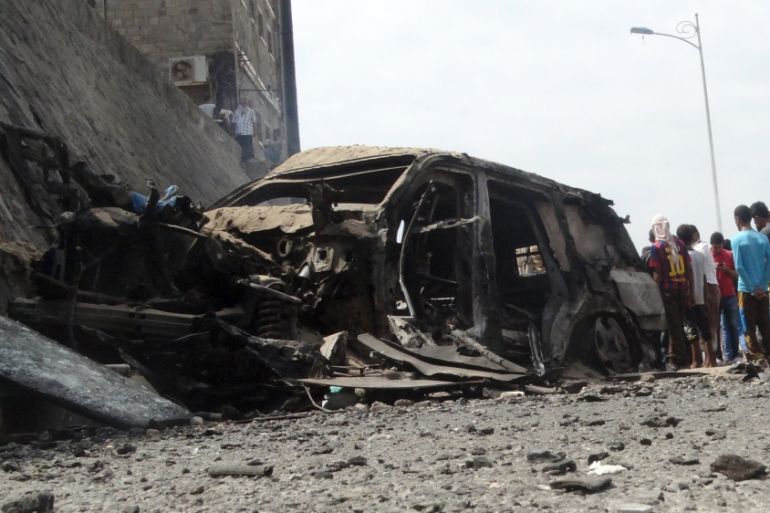Analysis: Beyond the fragile peace in Aden
Will a new round of talks end the war in Yemen?

Less than two months after his appointment as governor of Aden, Major General Jaafar Mohammed Saad and his security guards were killed in a terrorist attack for which the Islamic State of Iraq and the Levant (ISIL) group in Yemen immediately claimed responsibility.
During his short tenure as governor of Aden, Saad confronted extreme security challenges, including a short period of detention lasting only for a few hours, by some militia members in the city.
Keep reading
list of 4 itemsHow will Iran respond to Israel’s attack on its Damascus consulate?
US sanctions shipping firm accused of links to Iran, Yemen’s Houthis
Vessel struck in Red Sea as Houthis promise attacks on more shipping lanes
|
|
Although the Saudi-led coalition has succeeded in defeating the Houthi-(former president Ali Abdullah) Saleh alliance in Aden, the overall security situation in the city remains extremely vulnerable to frequent violence.
The recent assassinations of Colonel Aqeel al-Khodr, a top intelligence official, and Judge Mohsen Alwan, in addition to the control of two small towns in the South of Yemen by al-Qaeda in the Arabian Peninsula (AQAP), reveal ongoing sophisticated and calculated plans to undermine the efforts of President Abd-Rabbu Mansour Hadi’s government to bring stability to war-torn Yemen.
Furthermore, both the timing and location of these recent attacks raise some serious questions about the identity of those directing the newly established branch of ISIL in Yemen in an effort to halt the advance of the Saudi-led coalition towards Taiz and Sanaa.
Yemeni analysts say it is quite important to distinguish between ISIL operating in Iraq and Syria and the adaptation that is now emerging in Yemen.
WATCH: What is the solution to the war in Yemen?
The Yemeni ISIL offshoot, according to Khaled Alansi, a Yemeni attorney and human rights activist, emerged only when AQAP denied responsibility for attacks targeting Sanaa mosques and markets last March saying that it avoids targeting mosques to protect “innocent Muslims”.
AQAP controls parts of the vast southeastern province of Hadramawt, including the provincial capital Mukalla, which it seized in April.
READ MORE: Displaced Yemenis seek refuge in Taiz schools
Alansi explained that the increased criticism directed against Hadi’s handling of the situation originated primarily from forces seeking his removal from the presidency in order to further destabilise the political and security situation in Yemen.
Nevertheless, the fragile security in Aden is not exclusively because of the presence of terrorist organisations or those backing them.
“The reasons behind Aden being unstable go back to the political differences between parties of the legitimate government,” says Mohammed Jumeh, a Yemeni writer and political analyst.
“Of course the security gap which was left in Aden after the defeat of Saleh’s military and security forces, had played a central role in the security deterioration in the city.”
|
|
Hadi recently returned to Aden to oversee the military operations in Taiz, and has announced the appointment of five new ministers including Mohammed Hussein Arab as minister of Interior, a position that he once held under Saleh’s presidency.
According to Jumeh, the implementation of these changes without consultation between Hadi and Prime Minister Khaled Bahah suggests a lack of coordination and a silent power struggle between the two men.
It is also unclear whether Hadi consulted other key political players, such as the Islah party, Yemen’s Islamist and oldest political party, over these appointments.
On Monday, Hadi quickly appointed a new governor for Aden, Brigadier Idrous Gasim Alzabeedi, and a new director-general for Aden’s police force. Both men are well-known within the Aden local resistance forces and have strong ties to al-Hirak al-Janoubi, the separatist Southern Movement in the south of Yemen.
These appointments, however, will not bring stability to Aden unless Hadi also acts swiftly to reassure Aden’s citizens that their city will not fall back into chaos and civil war.
So far, Hadi has done little to accommodate or transform Aden’s popular resistance groups into a formal security force. This delay could easily result in catastrophe since these groups, without the legitimacy of being a formal security force, are incapable of restoring peace and maintaining law and order in the de facto capital city of Yemen.
Starvation in Yemen: ‘We are hoping just to survive’
It is ironic that while Hadi’s men provide soft targets for terrorist groups, the chairman of the Houthi revolutionary council, Mohammed Ali al-Houthi, and other Houthis leaders can move freely in Northern Yemen provinces without fear of AQAP or Saudi air strikes.
Al-Houthi recently made a surprise visit to the province of Ibb, declaring it “the province of peace and tourism”. His visit was intended to appeal to Yemeni tribes to sign a memorandum of understanding which calls for defending Yemen against the Saudi-led coalition.
These developments in Aden have occurred on the heels of an announcement by the newly appointed minister of foreign affairs that the Geneva talks would resume on December 15, 2015.
It was also announced that a short ceasefire will precede the talks in order to ease humanitarian suffering in Yemen, and as a sign of good will. This may also include confidence-building measures that could include the release of the Yemeni defence minister who was captured by Houthi forces earlier during the war.
Regardless of when the next round of negotiations commences, it remains unlikely that it will end Yemen’s crisis.